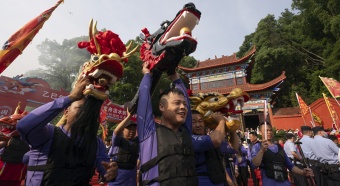The 70-year-old Cairo Declaration remains a cornerstone of peace in today's world, where most countries are free of war but some are still haunted by arrogant militarism.
On Dec. 1, 1943, after week-long intensive meetings in the Egyptian capital, then U.S. President Franklin D. Roosevelt (1882-1945), British Prime Minister Winston Churchill (1874-1965), and Chinese leader Chiang Kai-shek (1887-1975) jointly vowed to continue their military actions against Japan to "restrain and punish it" until its "unconditional surrender."
Rejecting any thoughts of selfish gains or territorial expansion, the three powers agreed their purpose was that "Japan shall be stripped of all the islands in the Pacific" it had seized or occupied since the beginning of World War I, and that "all the territories Japan has stolen from the Chinese, such as Manchuria, Formosa, and The Pescadores, shall be restored to the Republic of China."
Japan would also be expelled from all other territories it had taken by violence and greed, read the declaration issued at Cairo's Mena House, a restaurant complex near the renowned Giza pyramids.
The statement was published simultaneously in Washington, London and China's wartime capital Chongqing on the day it was issued.
Delivered at a crucial juncture and against the backdrop of the irreversible retreat of the axis of the German and Italian forces on battlefields across the world earlier in 1943, the Cairo Declaration set the tone for an imminent victory in World War II, as well as the goals for the post-war world order.
On July 26, 1945, the Potsdam Declaration, issued by the United States,Britain and China, reaffirmed that the terms of the Cairo Declaration would be carried out, and stipulated that "Japanese sovereignty shall be limited to the islands of Honshu, Hokkaido, Kyushu, Shikoku and such minor islands as we determine" and its military forces "be completely disarmed."
By signing the Instrument of Surrender a month later, Japan specifically accepted the provisions of the Potsdam Declaration, which incorporated the terms of the Cairo Declaration.
"We, acting by command of and on behalf of the Emperor of Japan, the Japanese government and the Japanese Imperial General Headquarters, hereby accept the provisions in the (Potsdam) declaration ... and subsequently adhered to by the Union of Soviet Socialist Republic, which four powers are hereafter referred to as the Allied Powers."
As the world marks the 70th anniversary of the historic Cairo Declaration, China stands resolutely in safeguarding its national sovereignty and territorial integrity.
While for Japan, which once showcased an apologetic attitude by accepting the Potsdam Declaration, it is wise to face history squarely and draw lessons from it to avoid being self-willed any more, or it will be carried further astray.









